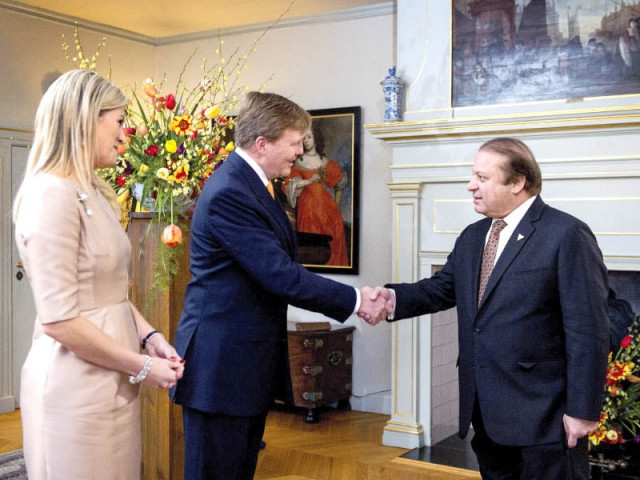PM pleads for balance in N-security
Nuclear summit ends with 35-nation pledge to prevent materials from reaching terrorists.

Dutch King Willem-Alexander and Queen Maxima greet Prime Minister Nawaz Sharif at the royal palace in The Hague. PHOTO: AFP
Pakistan and 34 other countries pledged to step up nuclear security on Tuesday, backing a global drive spearheaded by US President Barack Obama to prevent dangerous materials from falling into the hands of terrorists.
During his opening remarks at the ‘Informal Plenary on the Future of Nuclear Security Summit’, Prime Minister Nawaz Sharif stressed the need for achieving balance in nuclear security mechanisms. “In future, while implementing our decisions, we have to strike a balance between confidentiality and openness, and steer away from both alarmism and complacency,” he maintained.
The premier called for constant vigilance and preparedness at the national level as well as international cooperation, which were necessary to strengthen nuclear security. “Let me clarify, there is no such thing as ‘nuclear security fatigue’. Nuclear security is a continuous national responsibility,” he said.
In the years to come, states should maintain the political will and focus to advance the agenda of nuclear security, according to the premier. “Nuclear security must not fade off the radar screens of leaders,” he said.
The premier welcomed US President Barack Obama’s decision to host the next biennial Nuclear Security Summit (NSS) in 2016. “It is only fitting that this process, which was launched in the United States, is also concluded there. We know we cannot hold the summits in perpetuity,” he added.
In the last four years, three summits had made progress and the next summit would cover fresh ground. “We have to look beyond the present process and 2016.”
PM Nawaz stressed the need to broaden participation in this process for widening its ownership to enhance its legitimacy. “It makes perfect sense that beyond 2016, all members of the International Atomic Energy Agency own and uphold the decisions taken by the nuclear security summits.”
He added, “In close consultation with the IAEA membership, we should dispel the impression that the NSS process is imposing new mandates on the agency.”
In post-2016, the focus should be on synergy and coordination among various components of the nuclear security architecture, which comprises the IAEA, the UN 1540 Committee, conventions on physical protection of nuclear material and the suppression of acts of nuclear terrorism, and other relevant international forums.
The IAEA could play a lead role on this in accordance with its statute, he added.
PM Nawaz said to take this step beyond 2016, it was prudent to devolve the process to a lower level with the backing and continuing interest of leaders. “The process, we envisage, could be supported by senior officials and experts. The exact cycle and scope of the follow-up process, led by the IAEA, could be discussed at the 2016 Summit,” he added.
“By 2016, our four summits would have put substantial content on the table for follow-up and implementation, which are key for strengthening international cooperation.”
Similar to PM Nawaz’s remarks, US President Barack Obama said, “It is important for us not to relax but rather accelerate our efforts over the next two years, sustain momentum so that we finish strong in 2016.”
Wrapping up the third NSS, he maintained that given the catastrophic consequences of even a single attack, the world cannot afford to be complacent.
At the conclusion, a joint statement was unveiled with much fanfare in which 35 of the 53 countries pledged to work closer together and submit to “peer reviews periodically” of their sensitive nuclear security regimes.
These are the “closest things we have to international standards for nuclear security”, US Energy Secretary Ernest Moniz told reporters as he presented the pledge.
The first NSS was held in Washington in 2010, with a follow-up summit in Seoul before this year’s event in The Hague. The United States will again host the final summit in 2016.
Published in The Express Tribune, March 26th, 2014.



















COMMENTS
Comments are moderated and generally will be posted if they are on-topic and not abusive.
For more information, please see our Comments FAQ